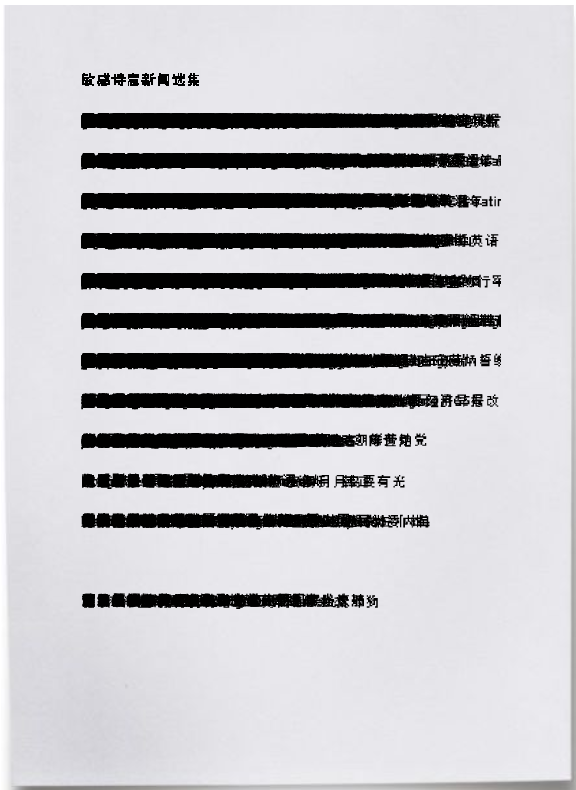June 2020
In January, I created (c)ensitive_words (2020)(fig.1), an interactive program that generates poems using words censored on the Chinese website. I did not write much about the work back then. But now, after months of discussions and revisions about the work with my friends and family, I may finally be able to articulate some points that at the time was just an impulse to me.

The work was created at a time the global Chinese community was commemorating the death of Doctor Li Wen Liang, Dr.Li was one of the first medical workers who warned his friends about the spreading of a new virus that causes symptoms similar to SARs on social media. Police issued him warnings for spreading misinformation. His death triggered mass discontent within the Chinese community about the Chinese government’s severe censorship.
Growing up, I was used to speaking “mindfully” on public occasions and not to discuss sensitive issues. Words censored on the internet were named “敏感词汇” in Chinese which can be translated as “sensitive words”. Such sensitivity has never occurred to me as something that could insidiously take lives. I researched about the list of the censored words on the Chinese internet one evening, after a conversation about Doctor Li’s death. It felt like climbing down to the basement of my grandparents’ house, filling up my lungs with the smell of the forgotten and unlighted memories. I set up to recollect the sections of realities that have been carelessly left behind.
As a result, I created the poem generating program that overwrites on itself.
I don’t want to explain why this font or why the overlapping effect as if these design elements represent some truth about the censorship. I created (c)ensitive_words as how it is because I found it necessary to lay my hands on those words, re-appropriate them, free them from the heavily-loaded sinister. I wanted to cancel their political connotations, no matter negative or positive.
(c)ensitive_words is not very much a condemning political statement but a sentimental out-reach to what has been willfully neglected by me.
I told many people that I tried my best to avoid creating art that comments on “Chinese Politics” in the western context. First off, I do not want to aestheticise the struggle of others and take ownership of the pain that is only remotely related to me. More importantly, I do not want to feed into the willful stereotype people have about China as an evil state and its citizen-slaves. It’s more complex than that. Very few established Chinese artists in the west care to address the recent history of colonisation, rapid modernisation and capitalisation on top of the cliche of “no freedom of speech.” It is all very tangled up, cultural annihilation and reconstruction is a result of many factors other than a manipulative government.
As for the censorship on words, Language(s) as the elements that construct individuals’ experiences and interpretation of realities are commonly bent to fit into the narratives issued by different states. This is true to China as to any other countries. Ideologies identify unitary sets of objectives that govern the reproductions of the existing social structures. No matter how much one is aware of it, it is not only Chinese people who are living in constructed sets of meaningfulness.
The work attempts to free words from the conspired and presumptuous judgements of righteousness from any side. The words are the words; the unsettled and fluid realities are forever upon the disagreeing linguistic grasps, and we should all be very humble about it.
Reference list
BBC (2020). Li Wenliang: Coronavirus death of Wuhan doctor sparks anger. BBC News. [online] 7 Feb. Available at: https://www.bbc.co.uk/news/world-asia-china-51409801 [Accessed 10 Feb. 2020].
He, Y. (2020). 敏感词汇(c)ensitive_words. Available at: http://he-yifan.com/censitive_words.html.
Larson, S. (2017). Was China ever colonized? - Quora. [online] www.quora.com. Available at: https://www.quora.com/Was-China-ever-colonized [Accessed 21 May 2020].
Vogel, E. (n.d.). Deng Xiaoping and the Transformation of China. [online] www.hup.harvard.edu. Available at: https://www.hup.harvard.edu/catalog.php?isbn=9780674725867 [Accessed 21 May 2020].